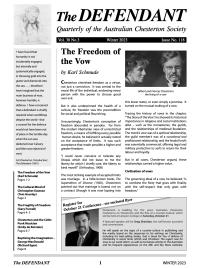
A speaker at this year’s Australian Chesterton Conference on October 21 is Peter Fenwick, a Melbourne businessman and author. Gary Furnell, Secretary-Treasurer of the Australian Chesterton Society, reviews his 2014 book, The Fragility of Freedom: Why subsidiarity matters (Connor Court, 2014), which is relevant to Chesterton’s social philosophy as well as to this year’s conference theme of an emerging counter-culture.
A few excerpts from the prologue are likely to encourage anyone sensible to read this book:
“The state has become pervasive in our lives. We have lost the belief that we can do things ourselves. We live with the peculiar notion that if we cannot afford some desired service it should be provided by the government. A cargo cult has developed in which the state has an inexhaustible supply of funds. The consequences are unmanageable debt, unsound money, poor investment decisions, and unfair burdens on the productive, the thrifty and the young.”
“Newly elected political leaders proclaim that they will govern for all constituents. That never happens. Our democratic system ensures that politicians act in the best interests of themselves, their party, their electorate and the sectional interests that support them. They do this at the expense of the wider group.”
“Policies are usually presented to show only their immediate effect or their effect on a single group. For balance, it is necessary to investigate the long-term effects, which may prove to be less desirable, and the expense of the policy on the wider group.”
There is a lot more worthy of close attention, and it’s embedded in only 226 pages divided into 8 succinct chapters. I read the book twice to try to fix the many wise principles in my heart and mind.
At times, I felt like cheering the good sense. For example, here is the definition of subsidiarity:
“Subsidiarity is the principle of devolving decisions to the lowest practical level, that what individuals are able to do, society should not take over, and what smaller societies can do, large societies should not take over. It facilitates a wider range of solutions, quicker and more informed decision-making, and greater involvement of more citizens. Because there is a diversity of solutions there is less chance of one bad decision causing a systemic failure. Because there is more responsibility for one’s actions there is less opportunity for moral hazard.”
Moral hazard means others to suffer the consequences of your bad decisions. Bureaucracies are exemplars of this folly: it’s always other people—never themselves!—who suffer from their faults and inefficiences.
Blessed variety
Peter Fenwick makes the point that subsidiarity provides variety and in that variety we can better see what does and doesn’t work. We can learn from each other’s successes and failures. Improvements can be emulated. Further, a multiplicity of views are presented, which encourages the emergence of different aspects of reality. It also means that domination by the majority—or one vocal minority—is more readily prevented. Individual liberty is enhanced.
Widespread prosperity and social peace go together. This distributed prosperity doesn’t arrive by government edict; it’s created by a variety of factors that are too complex and dynamic for anyone to govern. When governments try to manage them they harm them. Fenwick details these beneficial factors: specialisation, exchange and trade, trust, co-operation, cheap energy, innovation, investment, property rights, enforceable contracts (a just and efficient legal system), the synergies of urbanisation, and using everyone’s talents.
People who work hard and create wealth should be abetted, not scorned or seen as exploiters. Fenwick observes:
“Provided a man or woman has earned their wealth legitimately, and not by coercion or political influence, they should be admired not denigrated… Your opportunity to live a life of contemplation depends on others’ willingness to live the life of an entrepreneur.”
Throughout the book there are sections introducing key modern thinkers who have best articulated the principles of liberty, prosperity and responsibility, including Vaclav Havel, Matt Ridley and Ludwig von Mises. These introductions add value to Fenwick’s arguments by providing philosophical background and insights.
Muddle-headed government and crony capitalism
There are strong arguments for wealth creation via free enterprise—lifting many into relative prosperity. There are equally strong arguments against multiplying the government’s provision of services. Typically, these are inefficient, undiscerning, hugely expensive, unfair and hard to restrain. Welfare assistance, education and health services are best delivered by locally-based private organisations: charities, churches, friendly societies, small businesses, community groups, insurance schemes and user-pays systems. Fenwick laments that we are so accustomed to government provision of so many services that we find it difficult to imagine how else they might be delivered. In this, as in so many areas, entrepreneurs and open competition will show us how it can be achieved. Established bureaucracies will resist this change.
Crony capitalists will also resist this change. Cronyism involves businesses or entities (like unions) lobbying, exploiting or manipulating government to create conditions most suitable for themselves. They give capitalism and free enterprise systems a bad name. Fenwick notes, “Any business that behaves unethically, or illegally, or simply not in the interests of its customers fails because soon it has no customers.” Very large businesses tend to collapse eventually because they become indifferent to innovation, captured by self-seeking executives, and reliant on government contracts and support—which are changeable. They forget to focus on their customers and focus instead on secondary matters—for example, mates in government or extraneous social justice concerns.
People worry about jobs as automation, overseas trade and technological dynamism become ever more prominent. Peter Fenwick’s optimism is qualified:
“There is no need to fear that there will be insufficient work and an underclass of unemployed, provided that we do not permit the state to intervene in well-meaning but counter- productive ways. Jobs are created by entrepreneurs. We need to honour them and to create the conditions for them to flourish.”
Four Follies
Four chapters examine failed policies and aberrant ideas: socialism, interventionism, unsound money and distributive justice.
Socialism and Communism have shown themselves to be incredibly disruptive of entrepreneurial activity and wealth- creation. No socialist or communist country that has stayed faithful to socialist economic theory has succeeded in lifting their populations to prosperity. Communist China’s wealth expanded greatly after private enterprise was allowed. Typically, socialists try to micro-manage human and natural systems—an impossible task. In addition, they routinely suppress valuable but offending truths, compounding their mistakes. Many Western parliaments—including Australia’s— have embraced a socialist model of the welfare state and the result is entitlement, unwieldy bureaucracies and massive government debt.
Many Western nations have also embraced a socialist model of economic intervention—with similar results. Recessions are always the result of foolish government interventions in the market. Left alone, the free market would quickly self-correct through changed investment, entrepreneurial activity and the price mechanism, i.e. the market sets the price of commodities, jobs and services based on the unyielding realities of supply and demand.
“Government intervention not only creates the problem but it extends its duration by interfering with the market’s adjustment process. It props up businesses that should be allowed to fail. It continues to inflate the money supply. It keeps wages and prices up. It encourages consumption and discourages saving. It subsidises unemployment. In other words, well-meaning but poor policy creates the problems and prevents speedy resolution.”
Unsound money refers to our financial system based naively on government fiat—not on the gold standard. Governments print money that doesn’t reflect the nation’s economic realities. It controls money supply and influences interest rates through a central reserve bank, creating another deleterious distortion in the market.
If unsound money, self-defeating government intervention, crony capitalism and the welfare system aren’t enough drag on the economy, we’re also burdened with misguided re- distributive justice. This isn’t the encouragement of lots of small, independent enterprises as Chesterton and Belloc recommended. It’s taxing one set of people to give money to another set of people, creating greater dependence on welfare payments. The policy foolishly seeks to establish equality of outcomes irrespective of luck, skill, risk-taking, the giving and receiving of gifts, help from family and friends, personal application and hard work. In effect, this form of distributive justice is an injustice whereby one person pinches the wealth of another using the government as the pick-pocket. We should seek equity in outcomes, not equality of outcomes.
Peter Fenwick consistently extols the virtues of individual responsibility, thrift, hard work, family loyalty and support, life-long learning, careful (not reckless) compassion, volunteerism, integrity, diligence and real justice. He writes:
“You achieve your desires [for yourself, your business projects and your family] by rational persuasion, never by influence or coercion. Fairness and justice are not achieved by putting disproportionate burdens on the productive, the thrifty and the young. This is the morality of the free market, the basis for a fair and just society.”
The Fragility of Freedom: why subsidiarity matters is accessible, stimulating, inspiring, corrective and instructional. No inquisitive reader can ask for much more.
